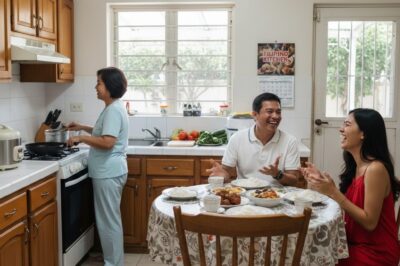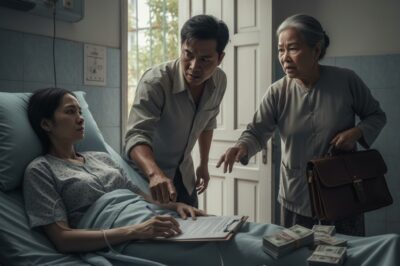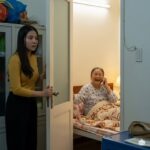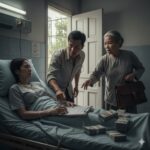On the holiday, I went back to my hometown with my husband. My mother-in-law warmly welcomed us with four enormous banquet tables. But midway through the meal, she stood up, introduced my husband’s mistress, and even gifted her two plots of land for bearing a son…
I clutched the stack of papers against my chest the entire way from the city to the countryside, like holding a sack of rice no one would ever cook. The papers were thin, but when the wind rushed through the cracks of the bus, they felt unbearably heavy. The national highway, lined with flags ahead of the holiday, glowed red. The fields, after the rain, drained of water, shimmered like salt. I watched the fleeting shadows of birds through the glass and thought of what the doctor had told me the other day: “The results are in. Please stay calm.”
Stay calm—I repeated it to myself like counting drops of soy sauce on my tongue.
Khải dozed beside me, his shoulder against the window, salt stains visible on the collar of his shirt. We had been married for four years, without children. I hadn’t planned to bring him back this time, but his mother had called, her dialect thick, laughing as if flames were about to burst from her stove:
“Come home for me, won’t you? Why not? I’ve already prepared four tables. The whole village knows there’s good news in this house.”
Good news? She didn’t say, and I didn’t ask. In life, people often speak only half a sentence.
The bus turned onto the red dirt road. The hot, dry wind blew in, carrying the smell of soy sauce and cooking smoke—a scent of childhood. The gate of my mother-in-law’s house stood wide open. Hanging from the eaves was a wind chime someone had sent from the South, its jingling evoking a fragile peace, thin as mist.
“Come in, come in! My golden daughter-in-law!”
She came out in a dark purple blouse, her hair pinned high with a silver hairpin that gleamed in the sun. Before I could put my bag down, she dragged me into the yard. Four tables overflowed with food: thinly sliced cured meat, boiled chicken with golden skin, steaming eel porridge, trays of pungent soy sauce, fish braised in sour broth, and cups filled with green tea. I was surprised: it was just a holiday, not a death anniversary. She patted my shoulder and whispered, excited but firm:
“I know you’re discreet, but this is something I’m so happy about. I want to make it loud, for the whole village to know. Don’t be upset with me.”
I smiled and lifted the cup of tea. The bitter taste lingered at the back of my tongue, like a low note foreshadowing the beat of a drum.
Relatives poured in, their laughter bursting like firecrackers. They offered blessings: “May your family prosper!” “May you soon have children to hold!” “An heir, an heir!” I sat in silence. Khải carried chairs, poured wine, his eyes avoiding mine as if they were avoiding the noonday sun.
Midway through the meal, his mother stood. She coughed lightly, straightened the edge of her scarf. The yard fell silent, as if someone had just dropped a chopstick. She raised her wine cup, her voice sharp but indulgent:
“Relatives, neighbors, everyone! Today I’d like to introduce someone—this is Hân. She is Khải’s mistress. She has given our family a strong baby boy. The ancestral land must have a son to inherit; only then can our ancestors rest in peace. So the two plots of land—the riverbank and the corner of the orange grove—I have decided… to gift to Hân and her son, as heaven’s reward.”
The wind seemed to pause on the palm fronds. I set down my tea, the soy sauce suddenly tasting bitter. Small gasps escaped, then were quickly swallowed. Someone sniffled. A child laughed. My eyes met Khải’s—inside them, I saw a beach scarred and torn apart.
Hân stood in the corner of the yard, nearly ten years younger than me, wearing a pale green áo dài, cradling a baby about three months old. The child slept, his forehead damp with sweat. She lowered her head, lips pressed tightly together, like someone standing on a fragile rope bridge. I looked at her fingertips, the faint blue veins rising beneath her skin. Suddenly, I remembered the nights I lay clutching my empty belly, listening to the fan spin, stretching out the endless wait.
Mother raised the red envelope, waving it:
“All the land papers are done. Properly notarized. I said I would do it, and I did. The eldest daughter-in-law has no children, so… the younger one outside will be counted in later.”
Her voice carried no malice, just the cold arithmetic of multiplication and division.
I stood up. No tapping chopsticks against bowls, no clearing my throat. I walked slowly, as though stepping across the silt flats after a flood. Placing my backpack on the table, I pulled out a stack of papers sealed in a clear plastic folder and held it up, level with everyone’s eyes.
“This stack of papers may be thin,” I said, my voice calm to the point of frost, “but heavier than four banquet tables.”
Mother chuckled dismissively:
“What are you doing, child? Women… such matters are for men to decide. Just eat and enjoy yourself.”
I glanced at Khải. He shifted in his seat, but his eyes could not break away from the folder.
“I’m sorry to do this today,” I continued. “But since you’ve called the entire village to witness your joy, then let them also witness my sorrow. This is the DNA test between Khải and Hân’s son. The conclusion: paternity excluded, probability of fatherhood—0.00%.”
No one gasped this time. A silence, heavy as an overturned bronze tray, descended. The wind rattled through the palms again, yet no one seemed to hear it. Mother froze for a second, then burst into laughter, crisp as peanut brittle:
“Papers, nonsense. Those testing places play too many tricks. The child is still small—how can it be certain? And besides… how could he not be Khải’s son? I see in him…” She stopped short, not daring to say “resemblance,” afraid her own mouth might trap her in a picture she could not deny.
I opened another sheet, stamped with bright red seals.
“And here is Khải’s semen analysis. Diagnosis: Azoospermia—no sperm. The doctor scheduled us for IVF. We’ve been seeking treatment for over a year. I stayed silent because I didn’t want to grieve you. But if you choose to celebrate this way, then I must grieve in my own way.”
Khải bowed his head. His shoulders shrank like a man about to fall ill. An aunt exhaled sharply; a man beside her clicked his tongue. I heard the buzz of a mosquito, sharp as a whispered curse.
Mother set the red envelope down, her hand trembling just slightly before regaining composure:
“No sperm then no sperm. But this family, heaven has blessed us—we already have a child to hold. Papers here, papers there… I don’t believe them. Hân, bring my grandchild out to greet the relatives.”
She turned to me, lifting her chin.
“Don’t stir things up. The land is mine to give. You have no say.”
I closed the folder. I smiled, the way one smiles before a shattered mirror.
“I respect you, Mother. But since you’ve called the whole village as witnesses, let them hear the whole story. The rest… I’ll leave for you to decide.”
I tucked the papers away, pulled out my chair, sat down, and lifted my cup of tea. I drank deeply. Bitter. Astringent. Burning. In the surface of the tea, I faintly saw my reflection, warped like a pond struck by stones.
That night, the house boiled like a marketplace. In the kitchen, Mother clattered angrily; the aunts sighed heavily. Khải sat on the porch, back against the column, eyes searching the darkness as if waiting for some rescue. I walked past. He called out:
“Em…”
One word burned against me like a fire ant. I stopped.
“Em… why did you do this? In this house… no one can endure it.” He swallowed hard. “Mother… she knows about me… but she wants a grandchild. I was wrong, yes. But… you are my wife. How could you…”
“I am your wife,” I repeated, “not your mother’s daughter. Don’t confuse the two.”
He pressed his forehead, breathing heavily. “Give me time.”
“Until tomorrow,” I said. “Until Mother goes to the commune office to hand over the land. I have another paper. I don’t want to use it. But if I must, I will.”
Khải lifted his face. In the dark, his eyes were like two dry wells. “You intend to destroy this family?”
“No,” I said. “I intend to return it to the foundation it was meant to stand on.”
On the morning of September 2nd, the commune was decorated with flags and flowers, loudspeakers blaring festive songs. At the gate of the People’s Committee, tables were set, young clerks opened their ledgers and poured tea. Mother wore a flower-embroidered áo dài, her hair neatly coiled, lips tinted pale pink. In her hand, still, was the red envelope with the “land documents.” Hân carried the baby, her eyes swollen. Khải followed behind, his steps faltering.
They sat down. The justice officer carefully handed out forms, checking IDs. Mother smiled, holding the pen. Her hand trembled and paused right at the signature line, like a sewing needle snagged on thick cloth.
“Before we proceed, I have something to say,” I stood up, my voice steady and clear. “Because this is a legal procedure, I want the file to include all relevant documents. Otherwise, people may accuse our commune of negligence later.”
The young officer looked up, frowning slightly. “What documents do you need to add?”
“Documents on the origin of this land,” I said, pulling a brown envelope from my bag. “And… regarding the purpose of this transfer.” I placed the envelope on the table, my fingers lingering on its edge. Mother shot me a glance, her lips pressed tight as thread.
“First,” I opened the envelope and drew out a notarized copy.
“This is the supplementary will of… Father—Mr. Phúc, your husband—certified on August 30th. In it, two plots of land—the riverbank and the corner of the orange grove—are clearly designated: ‘to be transferred for use by the Ánh Lý Scholarship Fund, established under the name of the eldest daughter-in-law—that is, myself—intended to support tuition fees for the girls of this commune.’ The land is joint property of you and Father. Father signed this before you attempted today’s procedure. If you wish to gift it, you need his consent. And Father… is still alive.”
The crowd buzzed. The young officer took the paper, read swiftly, his eyes widening before he hid it away.
“Where did you obtain this?”
“The night before last, Father handed it to me directly,” I replied, without looking at Khải, “and told me to bring it today. He said: ‘What can be made public, let it be public. What cannot, keep a shred of dignity.’ I’m… sorry, Father.”
“Nonsense!” Mother slapped her hand on the table, the sound hollow like striking bronze. “He’s old, his mind is addled. How can we trust him? And even so, the land is co-owned under my name. It’s my right to give it away.”
“Joint ownership requires joint consent,” the justice officer adjusted his glasses, his voice firm. “Please, Madam, calm yourself. This matter must be carefully reviewed.”
“Second,” I said, softly but resolutely, “about the purpose of this gift—because a son was born. I don’t think the commune can record that reason in the official minutes. And before we proceed further, the commune should also know… the child is not Khải’s son.” I drew out the DNA test I had shown the night before and placed it beside the clerk’s ledger. “Probability: 0.00%.”
The tense air grew suffocating. Mother shot up: “Stop it!” She turned to the officer. “She’s just his wife, jealous, inventing lies. Hân! Speak! Tell them!”
Hân clutched the child tightly, lips trembling, but said nothing. The baby whimpered under the scorching sun.
“Third,” I inhaled, my fingers brushing a second envelope. I locked eyes with Mother, holding her gaze long, before sliding out another paper.
“This is the test result… between the child and… Father.” I looked straight into the wide eyes of the officer.
“Conclusion: biological father confirmed. Paternity probability: 99.999%.”
Khải collapsed into his chair as though his spine had been pulled away. Mother froze as if unplugged from the wall, her hands gripping the table’s edge until her knuckles whitened. From the loudspeakers down the street, the “Marching Song” blared, its final note lingering like a question.
“I… I…” Mother stammered, eyes darting toward the commune gate, as if searching for a draft of wind to escape through. Then she slumped heavily into her chair.
“How could it… be—”
“It is,” a hoarse voice rang from the doorway. Father entered, hair silver as fishing net, eyes dim yet posture straight as the bamboo by our yard. He walked forward, placed his hand on the brown envelope I had just opened, touching it lightly as one touches a wound.
“I signed. No mistake. That child is mine. Not the firstborn grandson. As for the land… I’ve already given it away. Not to reward my own sin, but to repay this family’s debt to all the daughters who have always been placed beneath.”
He turned to Mother. His gaze carried no rage, only weariness.
“You knew all along. You called the entire village… for what? To save me from shame? Or to silence my daughter-in-law forever? You… did not stay silent. And she… she did not choose silence either.”
Mother broke down, her sobs raw and ragged.
“You… I… I was afraid… Do you know my greatest fear? That people would say our bloodline ends. That the world would sneer: ‘A daughter is like rain, scattered wherever it falls.’ I feared facing the clan. Don’t you put it all on me.”
She turned to me, her eyes bloodshot. “And you… what do you intend for this family? To rip it apart?”
I looked at Father, then at Khải. He raised his head, his eyes hollow, holding pain, shame, and a desperate will to take root in sand. I spoke slowly:
“I don’t want to tear apart. I want to stitch back, with a different thread. I’m not asking for land. I’m not asking you to change overnight. I only want two things: First—do not use the excuse of ‘a son’ to measure human worth. Second—the child needs a father, needs papers. Father, please acknowledge your child. Publicly. Let people gossip as they will—but the state’s records will speak the truth. As for the scholarship fund—I will establish it, just as you wished. Mother, if you love your son, if you love this family name, sign here: agree to the fund for our girls. Every coin is a straw keeping the foundation from rotting.”
Mother froze. Hân sat down, laying the child across her lap, dabbing his forehead with a cloth. Her tears fell, silently. Father pulled out a chair, sat, and drew a pen from his shirt pocket, ready to sign. He looked at Khải.
“Son… do you have anything to say?”
Khải stood, walked to Mother, and knelt before her.
“Mother,” he said, “if I’ve failed, scold me. But don’t… don’t use others to patch the hole inside me. I will sign… divorce papers, if she wishes. I know… I lack. But I still have hands, feet, I can live decently. And… the child… the baby… I ask Father to recognize him, so he won’t carry the stain of being someone’s bastard.” He turned to me.
“I… am sorry.”
Just two words, yet I heard them like rain pounding on a tin roof across the sky. I exhaled, feeling lighter, as if I had just set down a heavy basket.
The judicial officer spoke softly:
“The procedure for child recognition… we’ll guide you separately. As for the land—with this will, since the husband is also a co-owner, the donation will be put on hold. And… the scholarship fund, I support it.” He looked at me, hesitation flickering before turning into resolve. “If the family agrees, we can draft the minutes this afternoon.”
Mother-in-law lowered her head. She was no longer crying. She looked at the child—her husband’s child—his face both familiar and strange. Then she looked at me, as if at a woman who had walked through a storm without getting wet. Slowly, very slowly, she nodded.
The Ánh Lý Scholarship Fund was born that September. The name I took from my late mother—who sold noodles by the Lam River and passed away when I was in eighth grade—and also from the “light of reason” I wanted to shine into this house that had long lived by habit. The alluvial plot grew more rows of eucalyptus to give shade for the children studying in the afternoons. In the orange grove, a few large trees were kept, and a thatched reading hut was built. Father’s will was framed on the wall, beside a small handwritten sign: “Girls study free—Boys too.”
Father completed the procedure to recognize the child. The boy’s birth certificate changed the “father” to his name, and the surname followed. Hân was no longer called “mistress” but became “Tí’s mother.” People still whispered, but the cruel laughter lessened. When Mother-in-law went to the market, the fish seller called out, “Aunt Hợi, this fish is fresh for you,” in a friendlier tone than before.
I returned to Hanoi to handle the fund’s paperwork, collect books, and write small projects to request support from friends. Within a few months, the first scholarships were awarded to three ninth-grade girls—one of them from a family that my mother-in-law once sneered at: “That house has nothing but girls.”
And Khải and I? We sat together before I boarded the bus. He handed me a signed divorce petition. I kept it but didn’t file. I said:
“Go get a full checkup. Not because of children, but for your health. As for us… let time answer. I don’t hold grudges against you—I hold grudges against the way people used me. And that… I’ve already given back.”
“Thank you,” he said, his voice light like bamboo knocking in the wind. “If someday… you need someone to carry books, fix the roof, paint the walls… call me.”
I smiled. “I will. But not for me.” I looked toward the reading hut, where Father was hammering together another shelf. “For the girls in our village.”
One late noon, Mother-in-law came to the hut, carrying a basket of guavas. She set it down, glancing at the children reading, her voice soft as if afraid to disturb them:
“Can I… sit for a while?”
“Yes,” I cleared a seat.
She looked around. “Long ago, I gave birth to a baby girl first,” she said suddenly, like a shift of wind. “But she died in the womb. Since then, I feared daughters. Feared raising them weak, feared risks. And yet… look now, I must rely on you. Don’t be angry with me anymore. I… I was jealous of you. Strange, isn’t it?”
I looked at her hands, mottled with age spots, veins like dry streams. I placed mine over hers.
“Mother… ‘don’t be angry’ is hard. But ‘don’t repeat’… that we can do.”
She nodded, smiling crookedly. “Yes. Don’t repeat.”
I showed her the fund’s ledger. Each line carefully listed the girls’ names, their grade, the amount. She put on glasses, reading for a long time. Suddenly, she stopped at the name “Hân”—the woman she once called her son’s mistress. Her hands trembled, then she pulled a small bundle wrapped in red cloth from her basket.
“I… gathered this,” she said softly. “From selling a few field crabs I caught, and some garlic I grew. For… the fund. Write it as ‘from a woman who is a little less afraid.’”
I smiled, my throat burning as if someone had poured hot tea inside. I wrote down her words exactly in the ledger. She smiled. Sunlight pierced through the thatch roof, sprinkling golden dust over her hair.
At the start of December, Father fell ill. He called me into his room and handed me a thin envelope.
“For you,” he said. “Not money. A letter. I wrote it the other day, while watching the children read. I thought… if the day comes when I go, read this to your mother, to Khải, and to yourself too.”
That evening, Mother-in-law let me light the stove. The house smelled of dry straw. I opened the letter. My father-in-law’s handwriting was shaky but clear:
“Daughter-in-law, thank you for choosing to make things public. The women of this house have long carried the burdens men hid. I owed a debt; you repaid it with another kind of currency: dignity. I was weak, I was wrong. But at least I knew when to stop. From tomorrow, if I’m gone, don’t cry. No more tears. Save them for the day you laid those papers out in front of all the banquet tables and still held your hand steady. That day—I see it as the day this house was rebuilt.”
I folded the letter, slipped it back into the envelope, and placed it in the bookshelf drawer. Father-in-law recovered from the illness, but he grew weaker. He sat in front of the reading hut more often, eyes following each child who came to borrow a storybook.
A full year passed, and September 2nd came again. The commune lined the streets with red flags. The reading hut was busier than ever, little plastic sandals neatly lined up at the steps. I returned, bringing a box of new books and a few wooden dolls to teach the children storytelling. Mother-in-law welcomed me with a small smile. From afar, Khải waved, with little Tí toddling beside him, the sunlight gleaming on his bald head like a young pomelo.
“Come see this,” Mother-in-law tugged my hand. She led me to the backyard, to the alluvial plot. A new wooden sign had been put up, white paint with blue letters:
ÁNH LÝ SCHOLARSHIP FUND
“Don’t Repeat”
I laughed out loud. “Who wrote ‘Don’t Repeat,’ Mother?”
“I did,” she said, blinking quickly. “I borrowed your words.”
I stood there for a long time, listening to the wind blowing from the river, carrying the sharp fragrance of freshly dried straw. From afar, the loudspeaker played Tiến Quân Ca again, but this time it was children’s voices, off-key and endearingly sweet.
“Oh,” Mother-in-law suddenly remembered, clapping her hands. “Tonight we’ll just make one meal. Not four. I invited… the girls on the scholarship list. Will you stay and eat with us?”
“Of course,” I said.
“And…” she lowered her voice, glanced at me, “on this day last year… are you holding any more papers?”
I looked at her, smiling. “Yes.” I pulled a thin envelope from my bag. She startled, stepping back as if seeing a ghost from the past. I placed my hand over hers, reassuring: “This time… it’s a different paper.” I opened it and handed it to her. “A hospital certificate. I… am pregnant. Not a miracle or anything. We did IVF. Legal, proper. I told you last, because… I wanted you to hear it from me, not from the gossip of the village.”
She stood frozen, her eyes round as oil lamps. Then she clasped her hands, murmuring “thank heaven, thank Buddha.” She hugged me, her sweat mixed with the faint smell of old rice flour—musty yet gentle. When she let go, her eyes sparkled like someone who had just retrieved a lost marble from under the bed.
“So… I will have another grandchild,” she whispered, then burst out laughing, tears flying like sudden rain. “Girl or boy, it doesn’t matter. It’s all good, you hear?”
I embraced her, laughing loudly. That laughter pushed a cloud away from the eaves, spilling sunlight like poured honey. Khải stood at the doorway, smiling with teary eyes. Father-in-law tapped lightly on the reading hut’s post, as if keeping rhythm for a song just learned.
“Hey,” Mother-in-law suddenly squinted, calling out to Hân carrying Tí across the yard, “stay for dinner tonight, dear. This house… no longer needs separate tables. One is enough.”
Hân looked stunned for a heartbeat, then nodded, smiling softly. The wind slipped through the palm-thatch roof, leaves rustling like people nodding in agreement.
And as everyone laid out bowls and chopsticks, set up chairs, preparing for just one meal, I suddenly understood: The thin paper I held to my chest last year had done something no four banquet tables could do—it changed the way people divided. Not dividing land, or children, or boys and girls. But dividing silence.
In the countryside, people believe paper is the most important thing to “bring to the commune office.” But I believe there are things heavier than paper—like the wind. The wind carries stories, loosens the knots that tie tongues. The wind of this September 2nd blew from the alluvial fields into our yard, lifting a laugh, nudging a tear, and carrying a promise: don’t repeat.
News
TINAWANAN NG MGA INHINYERO ANG JANITOR NA NAKIKISILIP SA “BLUEPRINT,” PERO NAMUTLA SILA NANG ITAMA NIYA ANG ISANG ERROR NA MAGPAPAGUHO SANA SA BUONG GUSALI/th
Abala ang lahat sa loob ng Site Office ng itinatayong “Skyline Mega Tower.” Ito ang pinakamataas na gusaling itatayo sa…
AYAW TANGGAPIN NG HR ANG APPLICANT DAHIL ISA ITONG “EX-CONVICT,” PERO NAMUTLA SIYA NANG DUMATING ANG CEO AT YUMAKAP DITO: “SIYA ANG NAGLIGTAS NG BUHAY KO SA KULONGAN”/th
Kabadong iniabot ni Mang Dante ang kanyang NBI Clearance sa HR Manager na si Ms. Karen. Naka-long sleeves si Dante…
Pinilit ako ng asawa ko na ibigay ang aming master’s bedroom sa kanyang bata at magandang kalaguyo, at inutusan pa akong magluto para sa babae araw-araw. Pero hindi nila alam na ang hapunan ngayong gabi ang magiging wakas nilang dalawa. Lubos akong naghanda…/th
Ang tunog ng kutsilyo na humihiwa sa matigas na granite na cutting board ay paulit-ulit at tuyo, tulad ng tibok ng puso ng…
Ibinenta ko ang bahay na pamana para iligtas ang biyenan ko — ngunit nang bumalik ako para kunin ang cellphone, narinig ko ang isang masamang plano na ikinagulat ko nang husto…/th
Nagpakasal kami ni Tuan matapos ang tatlong taon ng pagmamahalan. Sa araw ng kasal namin, ibinigay sa akin ng aking ina…
Ang maysakit na asawa ay pinilit ng asawa na pirmahan ang divorce papers, ngunit noong sandaling lapat na ang tinta sa papel, pumasok ang biyenang babae at gumawa ng isang bagay na ikinagulat ng lahat…/th
Ang maysakit na asawa ay pinilit ng asawa na pirmahan ang divorce papers, ngunit noong sandaling lapat na ang tinta…
Katatapos ko lang manganak nang ang walong taong gulang kong anak na babae ay patakbong pumasok sa silid ng ospital at bumulong sa aking tainga: “Nanay… magtago ka sa ilalim ng kama! Ngayon na!” Bigla, may mga mabibigat na yabag ang umalingawngaw sa silid. At pagkatapos…/th
Katatapos ko lang manganak nang ang walong taong gulang kong anak na babae ay patakbong pumasok sa silid ng ospital…
End of content
No more pages to load












